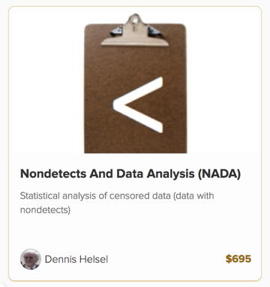Textbook: Statistics for Censored Environmental Data Using Minitab and R
The second edition of Dennis Helsel's t
extbook for statistics with censored data (published by Wiley, 2011) is available from your favorite bookseller. New in this edition are
✓ a chapter on multivariate methods for censored data,
✓ how to sum components of data with nondetects to obtain a total, and
✓ extensive use of methods that can incorporate values between detection and reporting limits ('remarked data').
Examples using R and Minitab are provided throughout the text.
The NADA2 package for censored data
The NADA2 package for the R statistical software system is fully integrated and explained in this course. It is freely available from the
CRAN site.
Free webinars for data analysis with nondetects
Several webinars on topics from our NADA course are available for streaming at
our Online Training Center. View one or all to get a feel for what the course is like. Of course there is much more content in the NADA course itself, including exercises you will perform to insure that you understand the techniques.
INSTRUCTOR
Dennis Helsel (PhD in Environmental Science and Engineering, Virginia Tech) has over 40 years experience in applying statistical methods to environmental sciences.
He has authored articles in numerous journals, including papers on handling nondetect data such as “More Than Obvious” (ES&T 2005) and "Much Ado About Next to Nothing" (Ann. Occ. Hygiene, 2010). Dr. Helsel has authored Statistics for Censored Environmental Data using Minitab and R (Wiley, 2012), the textbook for this course. Dr. Helsel is the 2018 recipient of the Lifetime Acheivement Award from the California Groundwater Resources Association, and a 2003 recipient of the Distinguished Service Award from the American Statistical Association's section on Statistics and the Environment.
